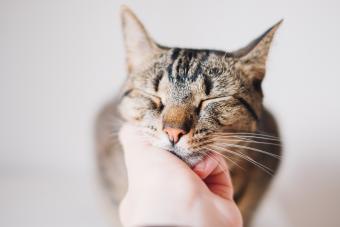
The sound of a cat’s purr is music to our ears, but what are they trying to tell us with all that buzzing? Cats purr for many reasons, such as to express joy or self-soothe, but the volume of their purr can give you even more insight into what they’re feeling. Find out why your cat is purring quietly, purring loudly, or why they’re not purring at all.
3 Reasons Cats Purr
We’re used to hearing (and feeling!) cats purr when they’re happy, but that’s not the only time they purr.
Related: Hear Examples of Cat Sounds
As Communication
Young kittens use purring as a way to communicate with their mothers as early as a few days old. They purr to let momma know they’re hungry or cold or to get their attention for something else. Many cats carry this behavior into adulthood and will purr when they want food or anything else.
A study even found that cats embed a cry into their purrs that triggers humans the way a baby’s cry does.
Out of Contentment
Cats often purr when they feel content and relaxed. That’s why if you pet your cat in their favorite spot behind their ears or pull out the good treats, they start revving like a Harley Davidson.
In Response to Pain or Stress
Cats will also purr as a self-soothing mechanism. The frequency of a cat’s purr is between 25 and 150 Hertz, which is also the range of vibration that’s been found to promote bone growth and help with healing. So, if your cat is injured, in pain, stressed, or uncomfortable, they may purr as a way to self-soothe and even heal themselves.
Related: How Do Cats Purr?
Interpreting Your Cat’s Purrs

Just like people, cats can use their vocalizations to express their emotions. A soft and steady purr might mean a cat is feeling relaxed, but the tempo and volume of a purr can indicate very different feelings.
Soft Purrs
Some cats are naturally quiet purrers. Growing kittens might have quieter purrs until they reach maturity, and smaller cats tend to purr a little softer than those with bigger vocal cords.
Loud Purrs
Some cats purr a lot louder than others, which could be due to their genetics or their emotional state. Larger cats are often louder than smaller cats, and certain breeds, like the Oriental Shorthair, have louder purrs than others.
Cats also tend to purr loudly when they’re incredibly happy or when they’re agitated or stressed. They're simply communicating with you using their own unique cat language.
Bella, a mixed breed cat from the UK, is the Guinness World Record holder for the loudest purr by a living domestic cat. Her purr measures at 54.59 decibels.
Absence of Purrs
And some cats don’t purr at all. This usually isn’t a cause for concern because there are many harmless reasons your cat might not purr. If you’re concerned, speak to your vet.
Why and How Do Cats Purr?
Along with why cats purr, there’s a lot of new research behind how cats purr. Cats are pretty mysterious and peculiar creatures, but that doesn’t mean you can’t connect on a deep level. Learning about why your cat does the things they do can allow you to create that deep bond. Get to know your cat and discover their unique quirks, like their purring volume and what gets them buzzing.







